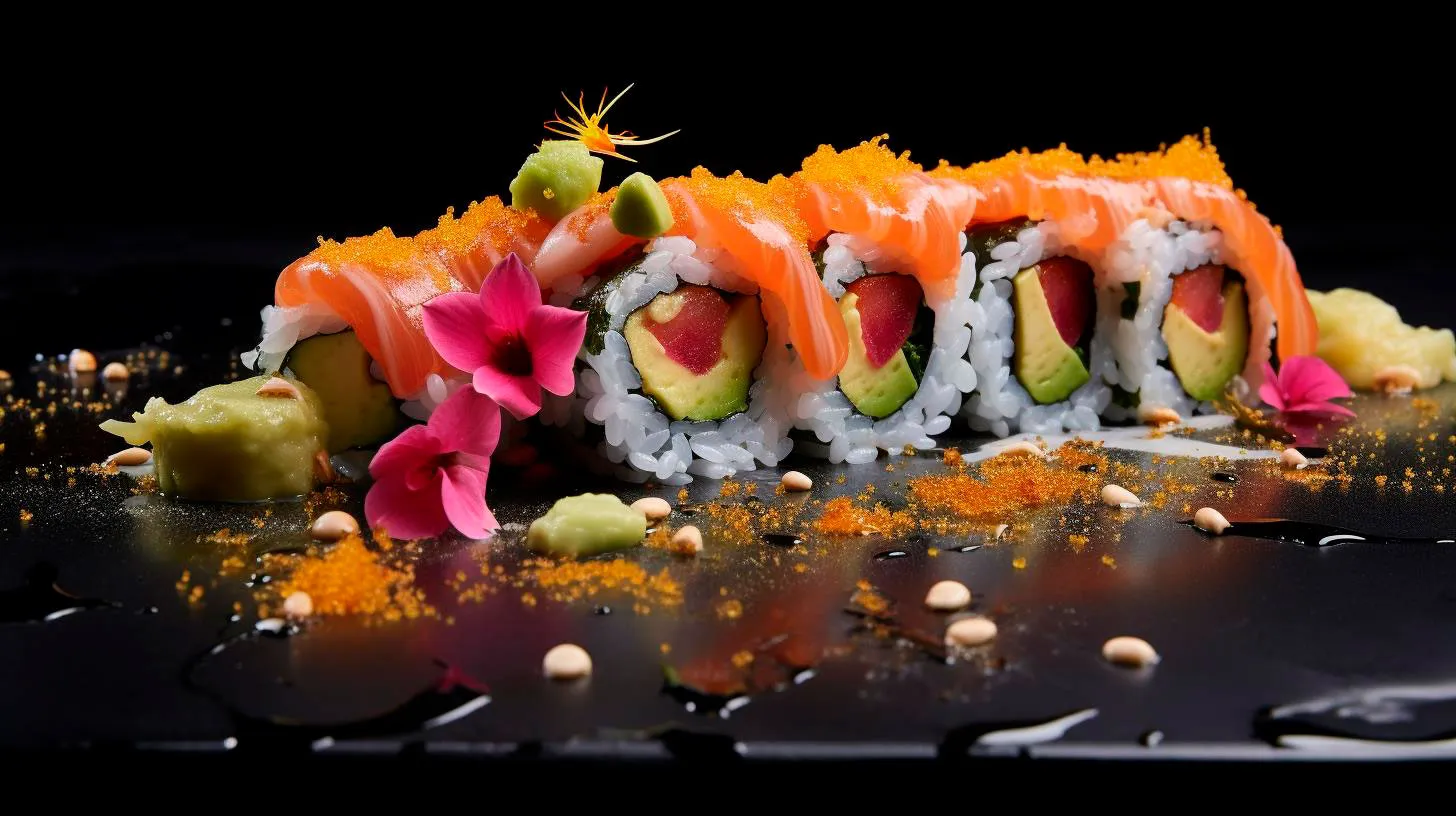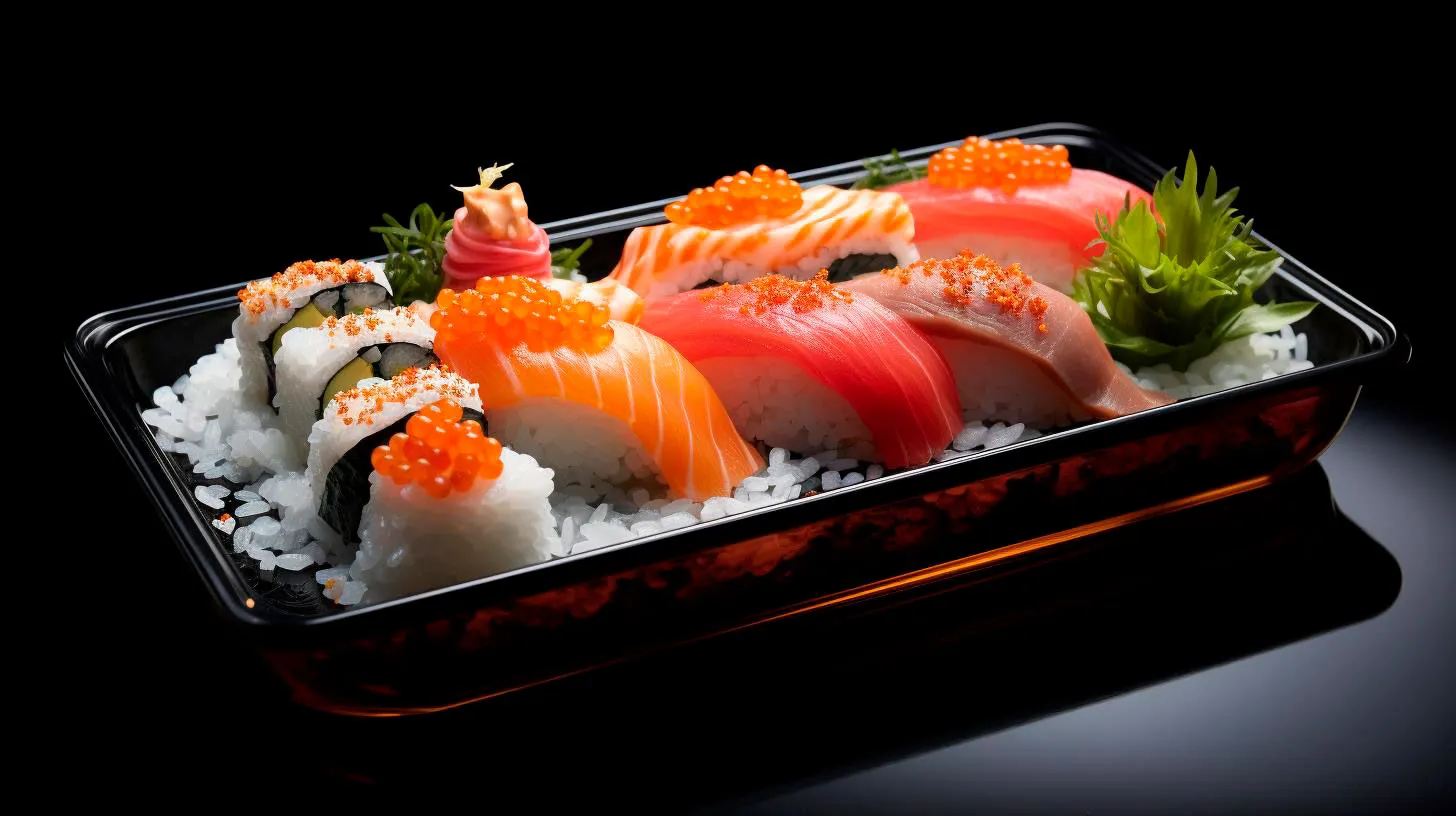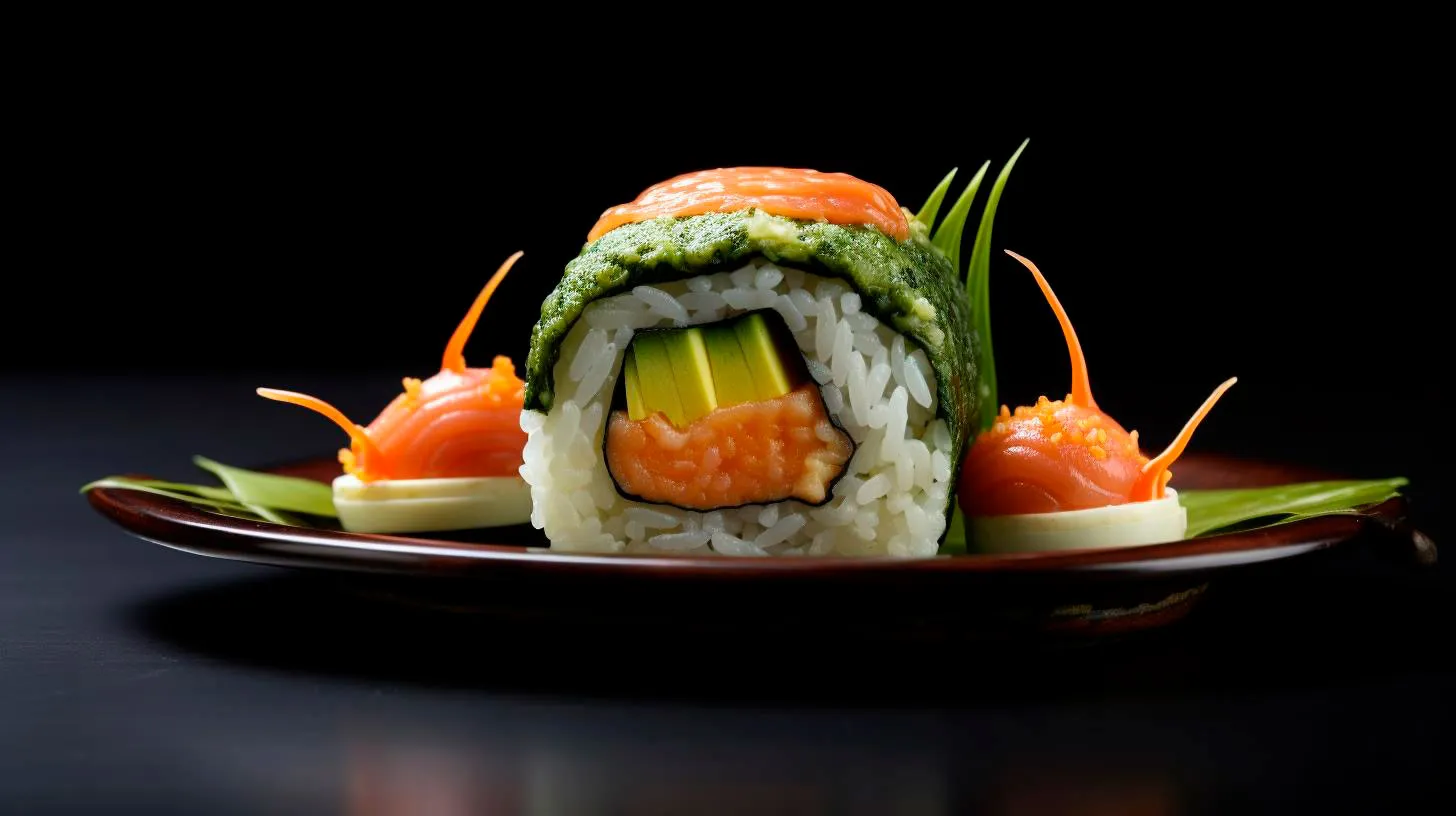From Ocean to Plate: Sourcing Sustainable Ingredients in Michelin-Starred Sushi Establishments
However, the question arises: How do these renowned restaurants ensure sustainability and responsible sourcing while maintaining their exceptional quality? Let’s delve into the world of sustainable ingredients in Michelin-starred sushi establishments and explore the measures they take to bring the best to your plate.
The Importance of Sustainable Sourcing
In recent years, sustainable practices within the food industry have gained significant traction. With concerns about overfishing, ecosystem damage, and the depletion of marine resources, it is crucial for sushi establishments, especially those holding Michelin stars, to prioritize sustainable sourcing. By doing so, they promote the health of our oceans, preserve marine biodiversity, and ensure the availability of quality ingredients for future generations.
The Challenges Faced
Sourcing sustainable ingredients for sushi is not without its challenges. Here are some of the hurdles Michelin-starred sushi establishments must overcome:
- Seasonality: Certain fish species have restricted seasons for fishing to allow populations to replenish. Sushi establishments need to adapt their menus based on the availability of sustainable options.
- Location: Restaurants located away from fishing ports face logistical challenges in obtaining fresh, sustainable ingredients. Expedited transportation methods are necessary to minimize the time between catch and plate.
- Supply Chain Transparency: It is vital for restaurants to ensure the integrity and transparency of their supply chains. They must have a comprehensive understanding of where their ingredients originate to guarantee sustainability.
Measures Taken by Michelin-Starred Sushi Establishments
Maintaining a commitment to sustainability, Michelin-starred sushi establishments employ various practices to source their ingredients responsibly. Here are some notable measures:
- Partnering with Sustainable Fisheries: These establishments collaborate with reputable suppliers and fisheries that follow sustainable practices. They prioritize partnerships with those certified by independent organizations such as Marine Stewardship Council (MSC) or similar entities.
- Strict Quality Control: Michelin-starred sushi establishments have rigorous selection criteria for their ingredients. They examine factors such as the fishing method, seasonality, and the impact on the marine ecosystem to ensure only sustainable options make it onto their menus.
- Supporting Local and Small-Scale Fisheries: By working closely with local and small-scale fisheries, these restaurants play a crucial role in supporting traditional fishing communities while ensuring responsible sourcing.
- Menu Adaptation: To embrace seasonality and sustainability, Michelin-starred sushi establishments frequently update their menus to showcase the best ingredients available at any given time. This allows them to stay true to their commitment to responsible sourcing.
The Benefits of Sustainable Sourcing
The efforts made by Michelin-starred sushi establishments to source their ingredients sustainably bring several benefits:
- Preserving Marine Ecosystems: By adhering to sustainable sourcing practices, these restaurants contribute to the preservation of marine ecosystems and the protection of endangered species.
- Supporting Local Economies: Through their partnerships with local fisheries, Michelin-starred sushi establishments stimulate local economies and help maintain the cultural heritage of traditional fishing communities.
- Ensuring Top Quality: Sustainable ingredients, caught responsibly and processed with care, result in sushi dishes of exceptional flavor and quality, providing an unparalleled dining experience.
Key Takeaways
The world of Michelin-starred sushi establishments goes far beyond taste and presentation. By prioritizing sustainable sourcing, these culinary marvels highlight the importance of responsible fishing practices and preserving the oceans’ delicate balance. Here are the key takeaways:
- Maintaining sustainability is essential for Michelin-starred sushi establishments in today’s environmentally conscious world.
- Challenges such as seasonality, location, and supply chain transparency must be overcome to ensure responsible sourcing.
- Partnerships with sustainable fisheries and local communities are crucial for securing a steady supply of sustainable ingredients.
- Sustainable sourcing not only benefits the environment but also supports local economies and delivers top-quality sushi.
So, the next time you savor sushi at a Michelin-starred establishment, rest assured that the journey from ocean to plate has been carefully crafted to ensure both an extraordinary culinary experience and the sustainability of our oceans for generations to come.
Revolutionizing Sushi: How Michelin-Starred Restaurants Inspire Sustainability in Japanese Cuisine
In response to this challenge, Michelin-starred restaurants in Japan are leading the way in revolutionizing sushi while promoting sustainability.
Embracing Sustainable Sourcing
One of the key ways Michelin-starred restaurants are inspiring sustainability in Japanese cuisine is through their commitment to sourcing sustainable ingredients. These esteemed establishments prioritize partnerships with local fishermen who practice responsible fishing methods. By supporting small-scale fishing communities, they contribute to the preservation of marine ecosystems and the livelihoods of these communities.
Some key features of their sustainable sourcing practices include:
- Obtaining seafood from well-managed fisheries
- Using locally caught fish to reduce carbon footprint
- Applying seasonal variations to their menus to take advantage of abundant local produce
By adopting these practices, Michelin-starred restaurants are not only ensuring the longevity of seafood resources but also providing their customers with an unforgettable culinary experience.
Promoting Responsible Fish Consumption
Michelin-starred restaurants understand the importance of educating their diners about responsible fish consumption. They go beyond simply serving sushi and take the time to engage with their customers, enlightening them about the origins of the seafood and the impact of their food choices on the environment.
Key takeaways from their efforts to promote responsible fish consumption include:
- Highlighting sustainable seafood choices on their menus
- Providing information about the fishing practices used to catch each type of fish
- Offering alternatives to overfished species
These initiatives empower diners to make informed decisions when selecting their sushi, encouraging them to support sustainable seafood options and drive positive change in the fishing industry.
Reducing Food Waste
In addition to sustainable sourcing and responsible fish consumption, Michelin-starred restaurants are pioneers in reducing food waste. They recognize that addressing sustainability goes beyond the sourcing and consumption of seafood and extends to minimizing the environmental impact of their operations.
Key features of their efforts to reduce food waste include:
- Using every part of the fish to create a variety of dishes
- Implementing precise portion control to minimize leftovers
- Working closely with suppliers to optimize order quantities
By embracing a “nose-to-tail” approach in sushi preparation, these restaurants demonstrate their commitment to sustainability and inspire others to follow suit.
Creating Awareness in the Culinary World
Michelin-starred restaurants hold significant influence within the culinary world, and they leverage this platform to create awareness about the importance of sustainability. By showcasing their commitment to responsible practices, they inspire other chefs, restaurants, and sushi enthusiasts to adopt similar measures.
More industry statistics reveal the impact of their efforts:
- Approximately 90% of the world’s fish stocks are fully exploited, overexploited, or depleted (FAO)
- 70% of the world’s fish populations are projected to be fully exploited by 2030 (World Wildlife Fund)
- Over 9 million tons of plastic waste enters the ocean each year, threatening marine life (UNESCO)
With these statistics in mind, the influence of Michelin-starred restaurants in shifting the narrative towards sustainability cannot be overstated.
Innovating the Future of Sushi
Much like the artistry behind their sushi creations, Michelin-starred restaurants continue to innovate and inspire the future of Japanese cuisine. Their commitment to sustainability not only ensures that future generations will indulge in the delights of sushi, but also reminds us of the impact our choices can have on the environment.
As sushi lovers, we have the power to support sustainable sources, make responsible choices, and advocate for change. The revolutionizing efforts exhibited by Michelin-starred restaurants serve as a guiding light in this journey towards a more sustainable and delicious sushi experience.
Exploring the Innovative Culinary Journey of Michelin-Starred Sushi Chefs
Join us as we embark on a journey to explore the innovative culinary world of Michelin-starred sushi chefs, where tradition meets creativity.
The Mastery of Traditional Techniques
Before we dive into the innovations of Michelin-starred sushi chefs, it is crucial to understand the deep-rooted traditions and techniques upon which they build their craft. These culinary artists dedicate years to master the art of sushi-making, honing their skills and perfecting the fundamentals.
Key Takeaways:
- Sushi-making is an intricate craft that demands precision and attention to detail.
- Mastery of traditional techniques forms the foundation for innovative sushi creations.
- Patience and practice are essential for achieving sushi perfection.
Pushing the Boundaries with Flavor Pairings
While traditional sushi relies on the harmonious combination of raw fish, vinegared rice, and wasabi, Michelin-starred sushi chefs are not afraid to experiment with unconventional ingredient pairings. This fearless approach results in unexpected flavor combinations that surprise and delight the palate.
Key Takeaways:
- Molecular gastronomy techniques are used to create unique flavor profiles in sushi.
- Pairing traditional ingredients with unexpected flavors elevates the dining experience.
- Mixing textures and temperatures adds dimension to sushi creations.
Artistry on a Platter
Michelin-starred sushi chefs are not only masters of taste but also artistic visionaries. Every piece of sushi is meticulously crafted to be an edible work of art. From the vibrant colors of the fish to the intricate arrangement on the plate, each element is carefully considered.
Key Takeaways:
- Visual appeal is just as important as taste in sushi presentation.
- Attention to detail enhances the dining experience by engaging multiple senses.
- Plating techniques create a visually stunning and aesthetically pleasing arrangement.
Incorporating Sustainable Practices
With the growing concern for sustainability, Michelin-starred sushi chefs have increasingly embraced eco-friendly practices. These chefs work closely with sustainable fisheries and local producers to source their ingredients ethically, ensuring the longevity of the oceans and the environment.
Key Takeaways:
- Supporting sustainable fisheries helps protect the delicate balance of marine ecosystems.
- Local sourcing reduces the carbon footprint and supports the local economy.
- Using seasonal ingredients ensures the freshest and most flavorful sushi creations.
The Evolution of Sushi
Sushi is a cuisine that continues to evolve with the times. Michelin-starred sushi chefs are at the forefront of this evolution, constantly exploring new techniques, flavors, and presentations. As culinary artisans, they strive to surprise and captivate their guests with ever-changing sushi innovations.
Key Takeaways:
- The world of sushi is constantly evolving, driven by curiosity and creativity.
- Maintaining tradition while embracing innovation is the hallmark of Michelin-starred sushi chefs.
- Every sushi experience is unique, guided by the expert hands of the chef.
Conclusion
The innovative culinary journey of Michelin-starred sushi chefs is a testament to their dedication, creativity, and passion for this ancient art form. From mastering traditional techniques to pushing the boundaries of taste and presentation, these chefs continue to redefine the sushi experience. As we indulge in their innovative creations, we partake in an unforgettable sensory adventure that celebrates the harmony of tradition and innovation.
Michelin-Starred Sushi Restaurants: A Blend of Luxury and Sustainability
Let’s dive into this extraordinary blend of luxury and environmental consciousness.
Luxury Redefined with Michelin-Starred Sushi Restaurants
With Michelin stars signifying culinary excellence, dining at a Michelin-starred sushi restaurant is an experience like no other. These establishments excel in providing top-notch service, exquisite ambiance, and of course, unforgettable sushi. From the moment you step into these esteemed restaurants, prepare to be transported to a world of opulence and refinement.
Key features of Michelin-starred sushi restaurants:
- Impeccable service that caters to your every need
- Elegant and sophisticated interiors designed to enhance the dining experience
- Finest quality ingredients meticulously sourced and handled
- Presentation of sushi as a work of art, both visually and in taste
- Expertly crafted seasonal menus that showcase the chef’s creativity
Sustainability Takes Center Stage
While luxury is a defining characteristic of Michelin-starred sushi restaurants, sustainability has become an integral part of their philosophy. With growing environmental concerns, these establishments are embracing sustainable practices in various aspects of their operation, seeking a harmonious balance between gastronomic indulgence and environmental responsibility.
Advantages of sustainability in Michelin-starred sushi restaurants:
- Preserving marine ecosystems by sourcing seafood responsibly
- Supporting local and artisanal suppliers, contributing to the local economy
- Reducing waste through innovative practices, such as utilizing every part of the fish
- Implementing energy-efficient systems and minimizing carbon footprint
- Emphasizing organic and locally sourced ingredients for a healthier dining experience
According to Greenpeace, overfishing affects 31.4% of global fish stocks, making responsible sourcing an urgent priority. Michelin-starred sushi restaurants are championing sustainable fishing practices and partnering with suppliers committed to sustainable seafood, ensuring the longevity of marine ecosystems while providing patrons with the highest quality culinary delights.
The Key Takeaways
Michelin-starred sushi restaurants are a perfect blend of luxury and sustainability. With their meticulous attention to detail, these culinary establishments offer a remarkable fine dining experience that tantalizes the taste buds and dazzles the senses. By prioritizing sustainability, they set an example for the restaurant industry, inspiring others to adopt eco-friendly practices.
In summary, here are the key takeaways:
- Michelin-starred sushi restaurants provide an extraordinary fine dining experience
- Impeccable service, ambiance, and presentation define their luxurious nature
- Sustainability is at the core of their philosophy, preserving and protecting the environment
- Responsible sourcing and waste reduction contribute to sustainable seafood practices
- These establishments inspire others in the industry to adopt eco-friendly practices
So, the next time you indulge in a divine piece of sushi, consider seeking out a Michelin-starred sushi restaurant near you. Not only will you experience unparalleled luxury and a gastronomic adventure, but you will also contribute to a more sustainable future.



